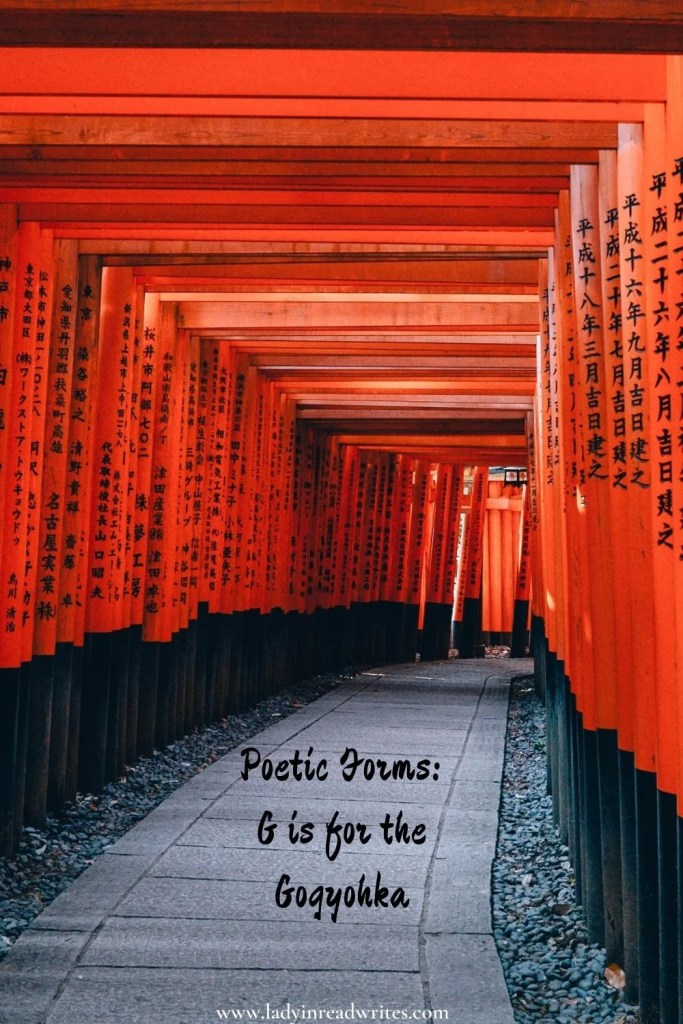Today’s poetic form is a Japanese form called the Gogyohka, which translates literally to ‘five-line poem.’ In addition, I feature a must-read book: Ghost in a Black Girl’s Throat
This post contains Amazon and other affiliate links . If you purchase through an affiliate link, I may get a commission at no extra cost to you. Please see the full disclosure for more information. Thank you for supporting my blog.

The Gogyohka Poetic Form
From Spain to Japan, as I move to the next letter of the alphabet! This time, it is the Gogyohka, an untitled, unrhymed Japanese quintain or 5-line poem developed by Enta Kusakabe. The Gogyohka has no restrictions on the length of each line, just that each one be a phrase.
The Gogyohka’s Characteristics
At its most basic, the Gogyohka’s characteristics are that it is:
- Stanzaic: written in one quintain or five-lined stanza
- Phrasal: Each line is one phrase
- Without restrictions on theme or meter or length of each line/phrase
- Untitled
- Unrhymed
My Gogyohka Attempts
Wonder where time flew?
Over the ages?
Into the clouds?
Across worlds?
Nowhere?
~ Vidya Tiru @ LadyInReadWrites
My little ones
laugh quietly
across the yard
sharing secrets
in loud whispers.
~ Vidya Tiru @ LadyInReadWrites
Further reading and h/t
Pin Me

The Book
Ghost in a Black Girl’s Throat

Title: Ghost in a Black Girl’s Throat
Author: Khalisa Rae
Publishers: Red Hen Press (April 13, 2021)
Genre: Poetry / American / African American & Black
Source: e-review copy from Edelweiss
What happens when a Midwestern girl migrates to a haunted Southern town, whose river is a graveyard, whose streets bear the names of Southern slave owners? How can she build a home where Confederate symbols strategically stand in the center of town? Can she sage the chilling truths of her ancestors? What will she do to cope with the traumatizing ghostliness of the present-day South?
This debut from Khalisa Rae is raw, honest, powerful, and unapologetic. I moved from one strong emotion to another as I read Rae’s poems. Poems talk about being invisible, being forgotten, about being treated as mere objects, and so much more. It includes themes of racism, feminism, sexuality, history, ancestry, ghosts of the past and the present, among others.
I started trying to make a list of the favorites here, the ones I will return to, many times over, and realized I was listing most of them. I started from the start and then from the last poem in reverse thinking I can give you a list of a couple, but I failed, since it is stunning from start to finish. Heartfelt, visceral, uplifting and heartbreaking at the same time, and simply phenomenal.
While this book does have a few triggers, it is all in all, a must read. Get it here
And Now, the End of This Post
Dear readers, have you read the featured book? I would love to hear your thoughts (if you have read it) as well as recommendations for similar books. What do you think about the gogyohka poetic form? Will you writing one? Do share if you do, I would love to read it!
Day 0 Day 1 – A Day 2 – B Day 3 Day 4 – C Day 5 – D Day 6 – E Day 7 – F
Linking up to BlogChatterA2Z, Blogging from A-to-Z April Challenge, NaPoWriMo, and the Ultimate Blog Challenge


Thanks for introducing me to this form of poetry.
Will surely attempt penning a few poems in this style.
I loved your attempts, especially the first one.
Cheers! 🙂
Lovely Gogyohka. I read a short book by the creator of Gogyohka a while back on kindle unlimited. You should look it up if you are interested in the form
Gogyohka – wow. There are so many poetic forms which I dont know at all ! Only Haiku – I knew. Both the poems created bful images in head. Khalisa Raes book U shared also sounds interesting!
Thanks
Dropping by from A to Z – https://afshan-shaik.blogspot.com/
Thanks for introducing me to Gogyohka. It’s really interesting how the Japanese language can be concise yet expressive.
I’m glad you find it interesting! Gogyohka seem to be a great way to add some extra flair to your writing. I am more familiar with Haiku. It seems that Gogyohka are usually about a specific subject matter, whereas Haiku are more about the moment and the feeling evoked by that moment. It also looks like Gogyohka tend to be more serious, while Haiku can be playful. (Yup! I did some additional research on this now that you introduced me to it!)
Thanks for sharing.
Have not read this book – it does sound raw and compelling.
Have a good weekend.
Digging a Grave
Thank you for the lesson in Gogyohka! Your examples are lovely.
Enjoyed both our poems! I always thought poems hd to rhyme but was I wrong! I never read Ghost in a Black Girl’s Throat but sit does sound interesting. Gotta check that out.
This is new to me. It’s also a wonderful exercise in creative writing.
Not sure I will ever write one of those poems. I stick with the more traditonal varieties.
I will check out that book, though. Sounds intriguing.
great poems, something new to try 🙂
awesome! Loving your imagery
I have not read the featured book nor have I heard of this form of poetry. You’re teaching me a lot today. Thanks for that.
I haven’t heard of this book or this type. I like that there is no limit to the words for each line as long as it is a phrase. That is an interesting element